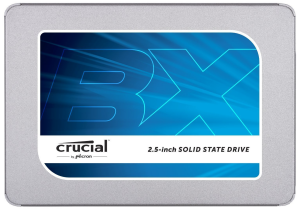

Model: Crucial BX300 240GB Solid State Drive
Manufacturer: Crucial
Provided By: Crucial
Crucial is a global brand of Micron Technology, Inc., one of the largest memory and flash storage manufacturers in the world. The company's product lineup includes award-winning solid state drives (SSDs) and computer memory upgrades (DRAM) for more than 50,000 systems. These products have been qualified and approved by major original equipment manufacturers and every single module has been rigorously tested at the component and module level. Each SSD also undergoes over a thousand hours of prerelease validation testing and hundreds of qualification tests to ensure optimal reliability and performance.
Earlier this year, Crucial launched its third generation BX-series SSD, the BX300. Aimed at the everyday consumer and DIYer looking to upgrade to an SSD, the BX300 offers substantial yet affordable performance gains compared to a typical hard drive. Powered by Silicon Motion's SM2258 controller and available with up to 480GB of Micron's 3D MLC NAND, the drive delivers 555 MB/s read and 510 MB/s write speeds for faster boot times, quicker application launches and better overall system performance. The BX300 is also 45 times more energy efficient than a typical hard drive, allowing users to run their systems longer, using less power.
The BX300 is available in 120GB, 240GB and 480GB capacities. For this review, Crucial sent us the 240GB version of the drive which is capable of delivering up to 555 MB/s sequential read and 510 MB/s sequential write speeds as well as up to 84,000 random read and 90,000 random write IOPS.
| Crucial BX300 240GB Solid State Drive | |||||||||||||||||||||||||||
General Specifications
Performance
Reliability
Environmental
Other Features
|
Needless to say, this is only a taste of what the BX300 has to offer. To give you an idea of what to expect, we'll take a closer look at Crucial's new SSD and then see how well it performs. Does the BX300 have what it takes? More importantly, is it the best bang for your buck? Keep reading as we find out.

